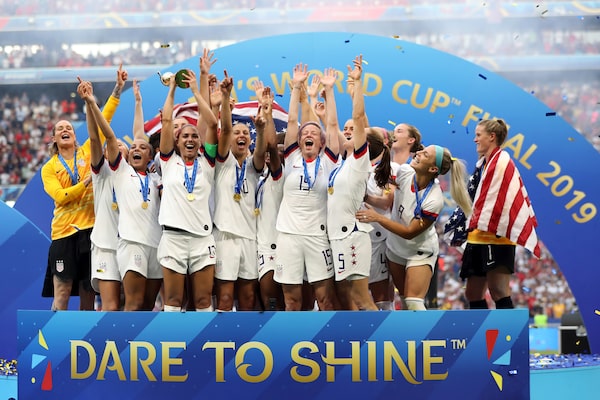Weird scene: At the World Cup in France, the crowd started chanting “equal pay” when the steamrolling U.S. women’s team captured the title on Sunday.
The soccer match became a sounding board for gender discrimination. The American players had filed a lawsuit in March accusing the U.S. Soccer Federation of providing lower salaries and poorer conditions than for the men’s team. At the stadium in Lyon, spectators from around the world rendered their verdict.
Not everyone was pleased. Internet comment boards lit up with male complainants saying that when female athletes generate revenue like men, they’ll be paid like men. But while the specifics are in dispute, the stellar women’s team has brought in more revenue in the past few years than the U.S. men’s squad, which wins squat by comparison.
There was grousing about sport becoming overly politicized. Contributing to the impression no doubt were television images from a Lyon bar where celebrating American fans interrupted a live Fox News broadcast by loudly chanting (with profanities) their distaste for U.S. President Donald Trump.

Alex Morgan lifts the FIFA Women's World Cup Trophy following her team's victory on Sunday.Elsa/Getty Images
Many, it appears, would prefer the athletes to keep their political views to themselves. Zipper the lips. Kick the ball. It was like Lebron James being told by a Fox News host last year to “shut up and dribble” when he offered his views on racial issues and politics.
But the World Cup will likely have the opposite effect. There will be no shutting up. It will spur athletes on to more social and political activism. And hurray for that.
The nonsensical notion that sports stars should keep their noses out of politics has been around for a long time. Everyone else can sound off. Doctors, lawyers, academics, barbers, bellhops. Not big-name athletes.
In fact however, the action of Megan Rapinoe and the women’s soccer team follows a long and storied history of sports protests – Jackie Robinson, Muhammad Ali, Bill Russell, Billie Jean King etc. – in the struggle for social justice.
In today’s America, not many enjoy higher standing or command larger audiences than leading sports figures. Sports is one area where you can say American exceptionalism is real. You wouldn’t say that about the state of politics or the economy with its egregious divisions of wealth or the national disunity or the appalling gun violence. There isn’t an overabundance of American pride these days. The greatness of the country’s sports stars is a leading source of self-esteem.
It was nice when the sporting world was more separated from the real world, when it was sheltered from the storm. But most everything has become more politicized. Entertainment figures spout their political biases all the time. Political insults are the bread and butter of late-night talk-show hosts. Religion became more politicized. Now sport has become a battleground for the culture wars as well.
In the United States (Canada’s big time sports politicizer with his right-wing sermons was Don Cherry), the divide was wide over the racial-justice protests by football quarterback Colin Kaepernick with his refusal to stand for the national anthem. It ended his career in the National Football League.
But given the bigotry and retrograde dispositions of the Trump presidency, athletes coming forward the way the women’s soccer team did is critical.
Sports can exert an exceptional unifying power and, with the cleavages in the country today, rarely has that power been more needed. Sport not only engenders patriotism and swagger but also a colour-blindness not seen as much in other domains. For black Americans, given the numerous sport superstars who are black, sport is a great point of pride. For most white Americans, the colour of the athlete doesn’t matter. The population delighted in the comeback of Tiger Woods with his victory at the Masters this year. The great run of 15-year-old African-American Coco Gauff at Wimbledon this week was stirring.
“Sport,” Nelson Mandela said, “has the power to change the world.” In breaking down divisions, in furthering social justice, athletes have led the way in the U.S. and elsewhere. On apartheid, it was sport that was used to isolate South Africa. At the 2018 Winter Olympics, athletes from North and South Korea marched together.
In the U.S., the champions of sport have become the country’s chief source of inspiration. The trend toward athlete activism like that of Megan Rapinoe on issues beyond sport isn't going to take away from that.
More likely it will make the country better.
Keep your Opinions sharp and informed. Get the Opinion newsletter. Sign up today.
 Lawrence Martin
Lawrence Martin